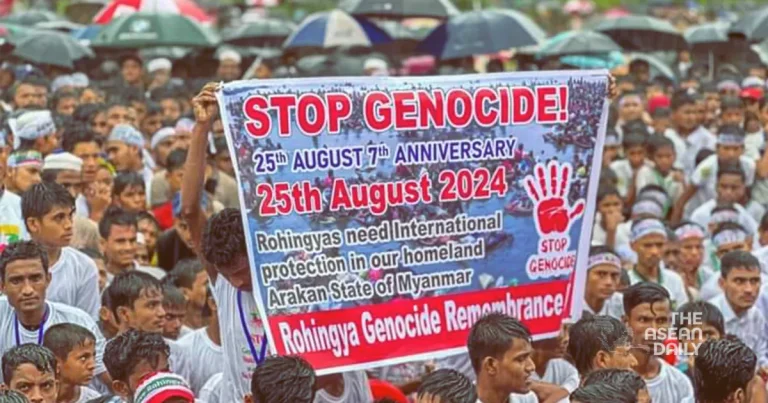26-8-2024 (DHAKA) The sprawling refugee camps of Cox’s Bazar in Bangladesh witnessed a sea of humanity as tens of thousands of Rohingya refugees gathered to commemorate the seventh anniversary of their forced exodus from Myanmar. The rally served as a stark reminder of their ongoing plight and their fervent desire for a safe return to their homeland.
The camps, home to over a million Rohingya, echoed with chants and slogans as refugees of all ages brandished placards bearing poignant messages such as “Hope is home” and “We Rohingya are the citizens of Myanmar”. Many participants wore ribbons emblazoned with the words “Rohingya Genocide Remembrance”, a solemn tribute to the events that led to their displacement.
Hafizur Rahman, one of the refugees present at the rally, voiced the collective sentiment, declaring, “Enough is enough. Stop violence and attacks on the Rohingya community.” This plea comes amidst reports of escalating violence in Myanmar’s Rakhine state, where clashes between the ruling junta’s troops and the Arakan Army, a powerful ethnic militia, have reportedly forced thousands more Rohingya to flee in recent weeks.
The 2017 military-led campaign in Myanmar, which the United Nations described as having “genocidal intent”, resulted in over 73,000 Rohingya fleeing across the border into Bangladesh. Seven years on, the situation remains dire, with the UN children’s agency UNICEF highlighting that “about half a million Rohingya refugee children are growing up in the world’s largest refugee camp”.
The protracted nature of their exile has strained resources and patience in Bangladesh. Mohammad Touhid Hossain, the country’s de-facto foreign minister, recently emphasised to Reuters that Bangladesh is at capacity and called for other nations, including India, to shoulder more responsibility. He also urged increased international pressure on the Arakan Army to cease attacks on Rohingya in Rakhine state.
For the refugees, the desire to return home is tempered by concerns for their safety and rights. Mohammed Taher, another refugee at the rally, articulated this sentiment: “We want to return to our homeland with all the rights. The United Nations should take initiatives to ensure our livelihood and peaceful coexistence with other ethnic communities in Myanmar.”
The anniversary rally underscores the complex geopolitical and humanitarian challenges surrounding the Rohingya crisis. As international attention waxes and wanes, the refugees remain caught in a limbo of statelessness, with most denied citizenship and other basic rights in Myanmar.
The situation is further complicated by the recent uptick in violence in Rakhine state, which threatens to create a new wave of displacement. UNICEF has raised alarms about civilians, especially children, being caught in the crossfire of the ongoing conflict.




